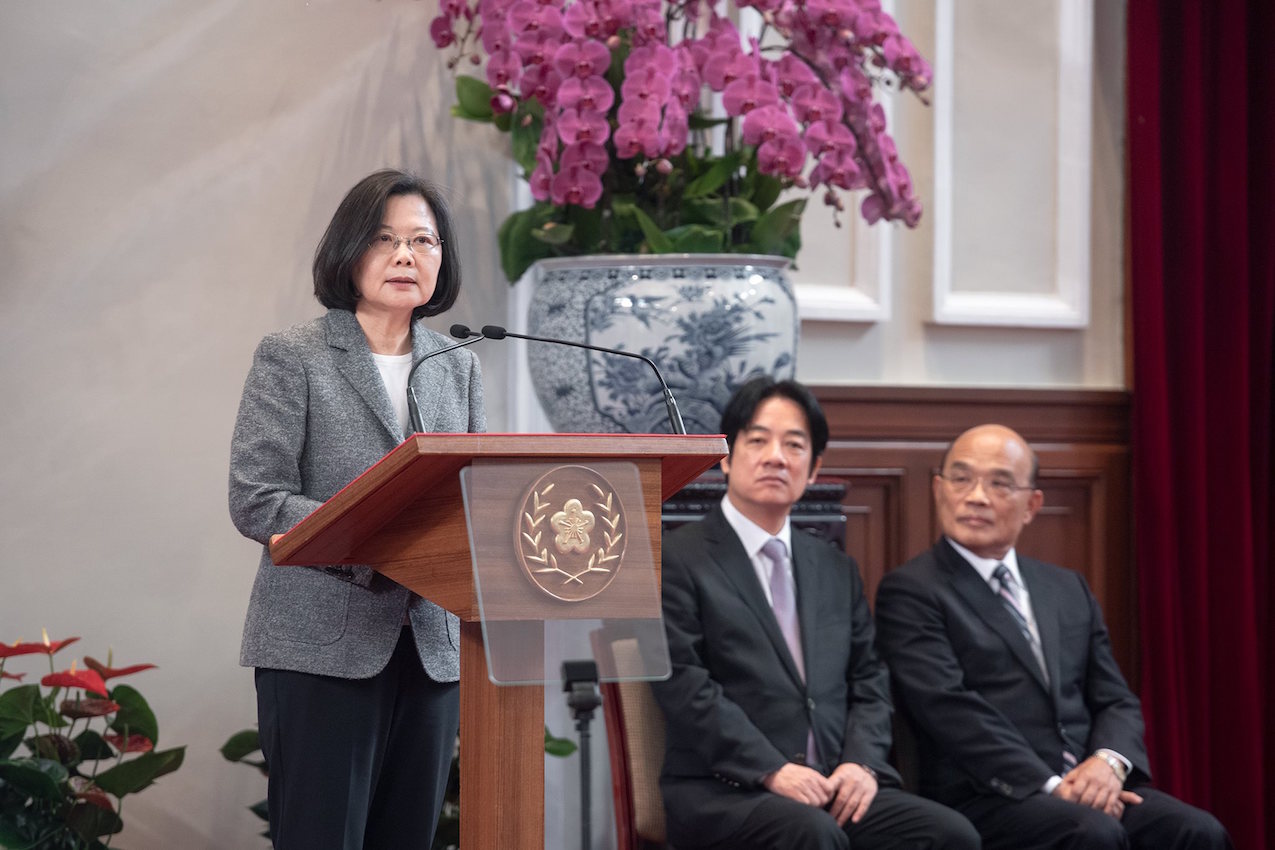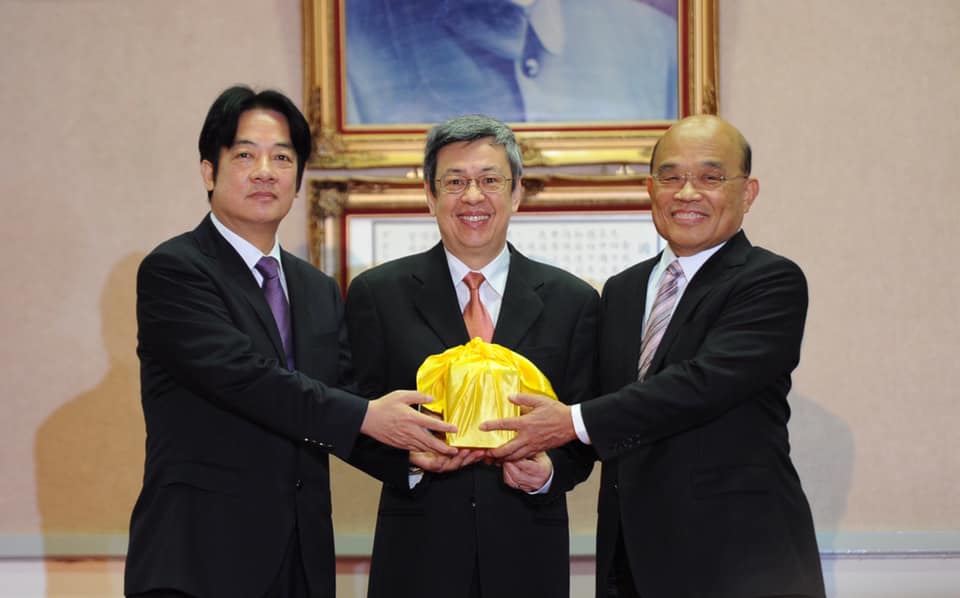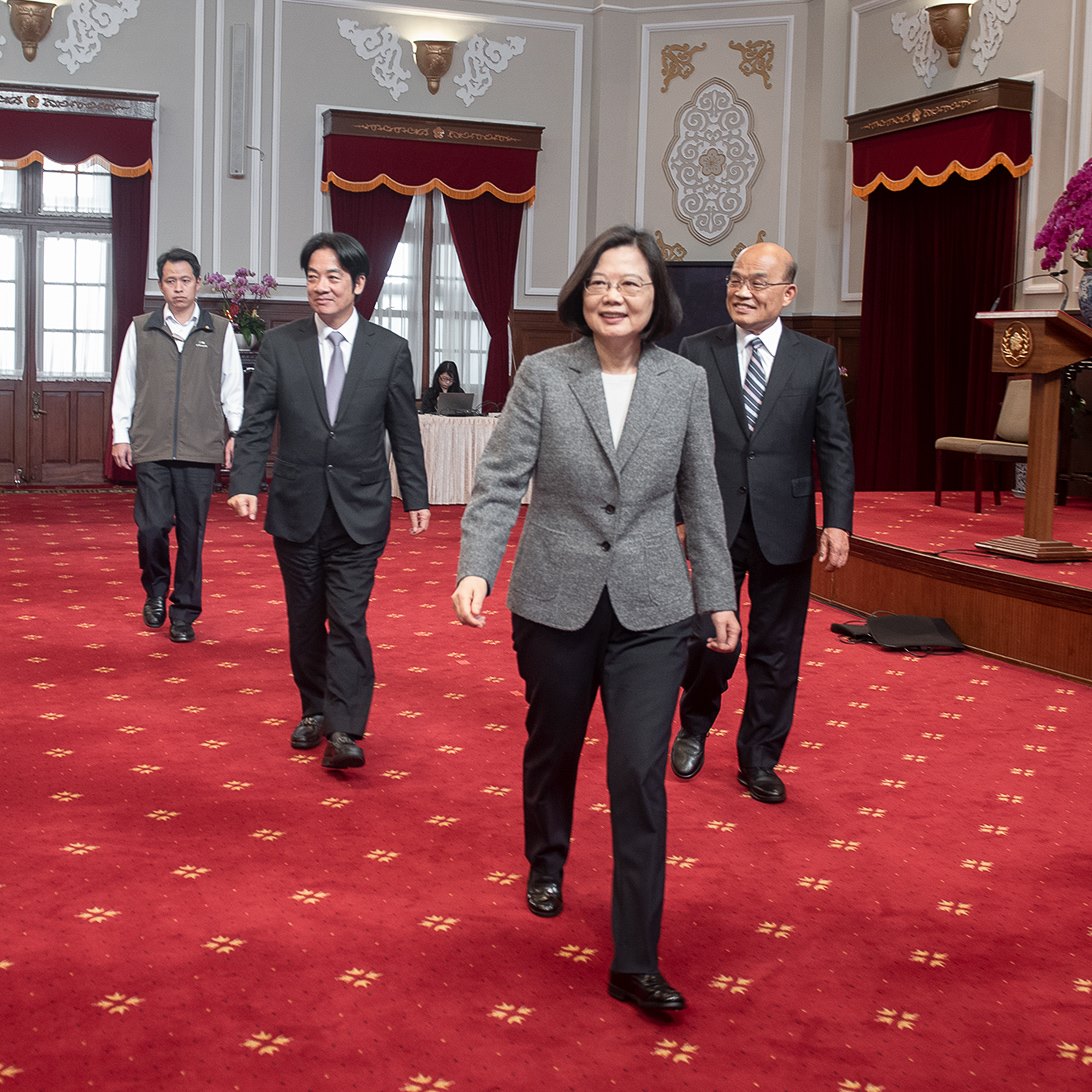by Brian Hioe
語言:
English
Photo Credit: Tsai Ing-wen/Facebook
THE REPLACEMENT of William Lai with Su Tseng-chang as premier raises a number of questions going forward. Namely, after the DPP’s widespread defeats in nine-in-one elections this November, Lai offered to resign in order to take responsibility for the DPP’s losses, much as President Tsai Ing-wen also resigned from her position as chair of the DPP as a sign of contrition.
Chen Chu, secretary-general of the Presidential Office, too, resigned. But Tsai asked Lai to stay on as premier, which Lai temporarily agreed to. Much speculation subsequently followed as to whether Lai would stay on as premier or whether he would eventually follow the same course. Lai was urged to stay by a number of prominent DPP politicians including Cho Jung-tai, who was recently elected DPP chair as Tsai’s replacement and who, like Lai, is affiliated with the DPP’s New Tide faction.
 President Tsai Ing-wen (left), William Lai (center), and Su Tseng-chang (right). Photo credit: Tsai Ing-wen/Facebook
President Tsai Ing-wen (left), William Lai (center), and Su Tseng-chang (right). Photo credit: Tsai Ing-wen/Facebook
In particular, some interpreted Lai’s immediate offer of resignation after the DPP’s losses as a signal by Lai that he was hoping to disentangle himself from the Tsai administration. Pro-independence traditionalists within the DPP who call on Tsai to step down from serving as the DPP’s candidate in 2020 presidential elections have suggested at times that they would prefer Lai as a more suitable presidential candidate.
Indeed, there had been longtime speculation before Lai’s appointment as premier that he would eventually leverage on his enormous popularity as mayor of Tainan to challenge Tsai for the DPP’s presidential nomination in 2020. Tsai appointing Lai as her premier may have been a way of co-opting Lai, in order to forestall the possibility of a challenge from Lai.
At the same time, this could have potentially been a short-sighted move. Premier is position often called on to take blows for the president by serving the voice which articulates unpopular policy decisions to the public. As such, while Lai could have potentially been saved up for a 2024 presidential run, Lai’s prestige has taken some blows during his tenure as premier, and his popularity may not be as high as it was when he was mayor of Tainan.
What now for Lai, then? This remains unknown. It is not impossible that Lai does in fact challenge Tsai later this year for the DPP’s presidential nomination, but this remains to be seen.
 Lai and Su flanking vice president Chen Chien-jen. Photo credit: William Lai/Facebook
Lai and Su flanking vice president Chen Chien-jen. Photo credit: William Lai/Facebook
On the other hand, it is to be seen what the DPP intends to do with Su taking up Lai’s former post as premier. This is not the first time that Su has served as premier and it is very likely that Su will be the last premier of Tsai’s remaining term.
At age 71, it is very possible that Su has reached the apex of his political career. Su being named premier comes on the heel of a defeat to Hou You-yi of the KMT in New Taipei city mayoral elections, for which Su was similarly running for a position he previously held. Su formerly served as the county magistrate of Taipei County before Taipei County was reorganized as part of New Taipei city.
Su’s loss in New Taipei city mayoral elections to Hou, a relative newcomer, was sometimes interpreted as a product of that Su was an old face who had occupied high-ranking political positions for decades. Voters may have preferred to give the younger and less experienced Hou a shot at political leadership.
As such, Su taking up the position of premier will do little to allay accusations against the DPP that it has become overreliant on the same set of old faces, and has failed to advance younger politicians to take up senior political positions within the party. This is why criticisms have followed against the DPP of failing to advance middle-generation politicians after its losses in November elections. Certainly, through the choice of Su as her premier to replace Lai, Tsai scarcely indicates any attempt to turn over a new leaf for the DPP.
 Photo credit: Tsai Ing-wen/Facebook
Photo credit: Tsai Ing-wen/Facebook
At the same time, again, it is to be remembered premier is a position which is called on to act as a shield for the president and Su is very likely the premier who will close out Tsai’s current presidential term. To this extent, it may be smarter to go with a politician already highly familiar with the public as Su as a choice to close out Tsai’s term, rather than to call on a middle-generation politician to take blows for Tsai in the lead-up to 2020 in a manner that might prove permanent damaging of that politician’s political reputation.
Nevertheless, a great deal will depend on what policies Tsai advances in her approximately one year left in office before 2020 presidential elections are to take place next January. This remains to be seen.

